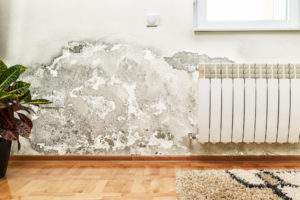Mold Could Be Impacting Your Health More Than You Realize

Mold is sneaky and resilient. With just a little bit of moisture, mold can quickly start to creep up, and before you know it, you’ve got a real problem on your hands. Because mold can be so challenging to get rid of, though, many homeowners tend to throw up their hands and give up. After all, how much harm could a little bit of mold on the bathroom ceiling or along the basement walls really be doing to you and your family? Unfortunately, it could be negatively impacting your health and quality of life a whole lot more than you realize. Today’s post will highlight the health hazards associated with mold inside your home and what to do about it.
Mold Sensitivity
According to the Center for Disease Control (CDC), some people are more sensitive to mold than others. This means that just because you may not feel like mold is a big problem in your home doesn’t mean that your spouse, children, or pets aren’t suffering. Everyone reacts differently to ongoing exposure to mold, and it could pose a serious threat to certain members of your household if it isn’t treated. If even one person in your home expresses discomfort, it’s imperative that you quickly resolve the issue.
Discomfort
Starting with the mildest symptoms of mold exposure, let’s look at the types of discomfort that can arise from exposure. Many people who are around mold complain of discomfort and problems associated with general nasal stuffiness, increased snoring, throat irritation, eye irritation, coughing, and wheezing.
Allergies
Some people are outright allergic to mold and will be constantly uncomfortable and in an unhealthy state until the mold is abated. Other people may not be directly allergic to mold, but their allergy symptoms will be further aggravated by its presence, making it much more difficult for them to live comfortably and function on a day-to-day basis.
Asthma
While mold does not directly cause asthma, the presence of mold can be extremely problematic to those who are asthmatic. Because mold can make it more difficult to breathe and may contribute to coughing and wheezing, people who have asthma often complain that their symptoms are much worse when they are living in an environment that contains mold.
Upper Respiratory Illness
A 2004 study conducted by the Institute of Medicine (IOM), the results of which continue to be relevant today, stated that sufficient evidence exists that can actually link an individual’s indoor exposure to mold with a number of upper respiratory illnesses and symptoms like coughing, wheezing, and shortness of breath in people who are otherwise healthy, and significantly increased sensitivity to pneumonitis. This is especially true in the case of children.
Pneumonia
It has been suggested that prolonged exposure to mold could lead to an increase in pneumonia. While this is only a possibility, many people that we should err on the side of caution and add this to the list of concerns.
Getting Rid of Mold
As stated previously, mold is very stubborn and resilient. Although many homeowners will attempt to get rid of mold on their own, they may quickly become frustrated when the mold keeps reappearing, or even growing and getting worse over time. In addition to being difficult to get rid of, mold abatement can be dangerous. The use of chemicals like bleach in the confined and enclosed spaces where mold likes to grow can make you very sick and lead to other complications.
For best results, it’s in your best interest to look for a professional mold abatement service with the training and tools required to get rid of mold the first time – and for good. This will ensure that you and your family are able to live a comfortable and happy lifestyle.
Need a professional to get rid of your mold problem? The professionals at Abbotts Fire & Flood can help. Give us a call or reach out online for a free estimate today.
